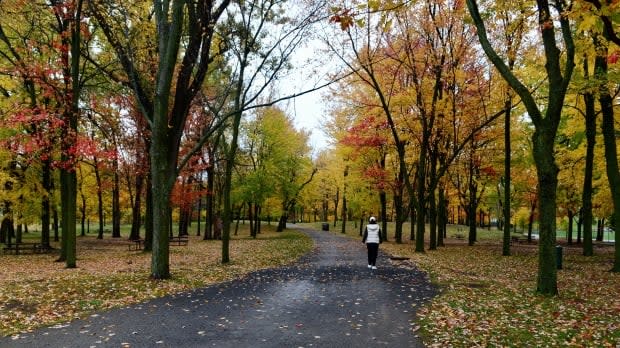Pandemic taking a heavy toll on the mental health of young Quebecers, public health study finds
Victoria Pesce has been stuck at home with her family for months, attending class through a computer screen and not seeing her friends in person.
"I found myself crying a lot more this summer than I've ever cried in my life, for things that I didn't understand," the 23-year-old Montrealer said.
And Pesce isn't the only one feeling that way.
As the COVID-19 pandemic drags on, an increasing number of young people say the situation is wearing on their mental health, according to research by Montreal public health.
A recent study found youth are often feeling the collateral effects of COVID-19 — 30 per cent surveyed were found to have a problematic level of psychological distress.
That's two and half times higher than the population at large. More than one in five described their mental health as poor or adequate.
The web-based survey was conducted by Léger marketing between March 21 and May 31 with funding from Quebec public health.
The results are based on a sample of 1,000 Quebecers of different socio-demographics.
Factors such as sex, age and language were also taken into consideration, according to the report which is available online in French.
Young Montrealers struggling more
In Quebec, more than one in five young adults perceive their mental health as fair or poor. That comes out to about 22 per cent of young adults. As for the population as a whole, the number is closer to 13 per cent.
In Montreal, 46 per cent of people aged 18 to 24 years report symptoms of generalized anxiety or major depression. In the rest of the province, that figure falls to 31 per cent.
Ongoing research is needed to document the impacts of COVID-19 response measures on other aspects of young people's lives, such as on social interactions, the report says.
The report also cites previous studies which have found a large majority of CEGEP and university students reported less motivation for their studies.

This is something Pesche knows all too well.
"Motivation is gone," she said.
"In terms of procrastination, it's 10 times higher. I'm home right? Everybody's home. You can do it later, why do it now? We're stressed now. There's other things that I have to deal with now."
She'd like to move out of her family's home in LaSalle while she finishes up her studies at Concordia University, but she said, the pandemic's financial impact has made it impossible for her to follow through with that idea.
Anxiety of not knowing what lies ahead
Mental health advocate and executive director of AMI Quebec, Ella Amir, said she's seen an increase in the number of young people seeking mental health services.
"Now it's seven months and we don't know when it's going to be over," Amir said. "I think there's anxiety not only about the past seven months, but what's going to happen next."
Montreal public health director Dr. Mylène Drouin said her agency plans to work with partners to find ways to reduce the pandemic's impact on youth.
For now, Montreal public health is recommending young people limit information consumption by staying updated on current events through reliable sources rather than social media.
Young people should keep up on their healthy lifestyle habits by sleeping enough, eating well and not overusing cannabis or alcohol, the report also suggests.
Maintaining social contacts is also important, it says, as talking with friends and family regularly "can make a difference."
When asked during a press briefing Thursday about the mental health of young people who don't have sports or other entertainment outlets, Premier François Legault said he is aware of the problem.
He said it is difficult to find solutions because of the risks associated with gathering in large groups indoors or playing team sports.
The Oct. 28 deadline is fast approaching. That's when gyms, restaurants, bars and other businesses are supposed to reopen in Quebec's red zones.
The Legault government is giving itself until the beginning of next week to determine whether the current measures will be kept in place even longer.

